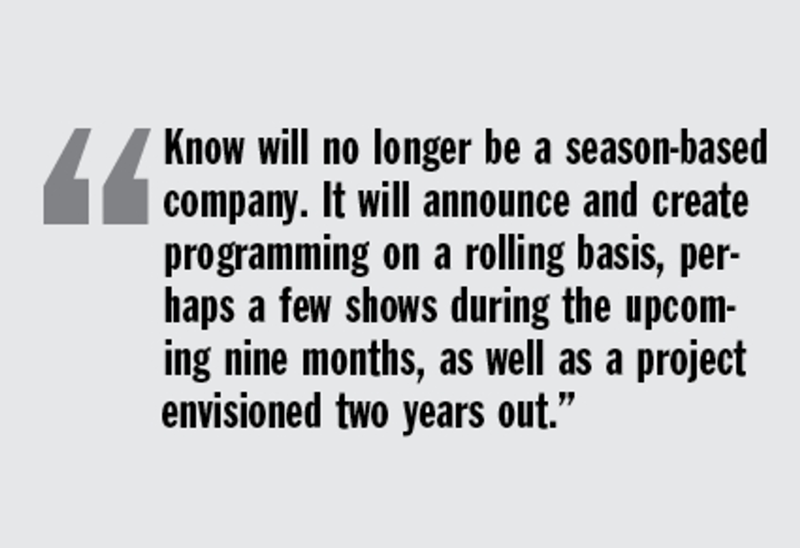When Know Theatre of Cincinnati was launched in 1997, it was an itinerant theater company. In fact, it was called the “Know Theatre Tribe” and its shows, touring productions and readings directed by founder Jay Kalagayan, were presented at bookstores and art galleries around town. Within a few years the Tribe settled into Gabriel’s Corner, an Over-the-Rhine church basement that was home until 2006, when it moved to 1120 Jackson St., also in OTR, thanks to the generosity of donor David Herriman. (He purchased the building, which he leases to Know for a friendly rate.) By then, Kalagayan had partnered with Jason Bruffy, an entrepreneurial director who launched the Cincinnati Fringe Festival, which became a Know project.
Bruffy recruited Eric Vosmeier to manage the Fringe, and when Bruffy departed, Vosmeier took charge, becoming Know’s artistic director in 2010. The company gets by — like many of its audience members — on a paycheck-to-paycheck basis, allowing little time for longer-term planning. But at a stakeholders’ meeting last week, Vosmeier announced some big-picture thinking by the staff and board of directors.
It was slightly overdue in the minds of many: While most local companies are presenting the second production of their 2012-2013 seasons, Know has yet to announce anything, let alone produce something. (The theater hasn’t been dark: Fringe Festival “encore” shows have been offered, as well as the popular Beggar’s Carnivale. Groups like True Theatre and OTR Improv, which Know supports through its “Jackson Street Market,” have kept people coming.)
Vosmeier has struggled to sustain seasons of new shows, but lining up rights in a timely manner is never easy. In the six seasons he’s been with Know, every season has involved adding or dropping a show or substituting something that came available after the season announcement. At the meeting, Vosmeier shared a flexible but ambitious plan for the company that hearkens back to its roots and more clearly identifies its mission, valuing “a playful artistic community where artists can collaborate and grow.” Vosmeier cites the 2010 production of Angels in America as a good example, an undertaking that involved more than 100 artists. In the future, he would like to do even more with a show like that, engaging dozens of community connections.
Know’s operating budget, just a hair above $500,000 (compare that to the Cincinnati Playhouse at $14 million), gets a lot done on a shoestring. And thanks to efforts like the annual Fringe, Know’s outreach to the community has been rewarded by the funders at ArtsWave, who gave Know the second-highest rating on “impact-funding,” a new standard being used to grant support from its annual campaign to support local arts.
So what does all this mean? And will Know announce a season soon? Well, yes, kind of. Here’s the framework Vosmeier shared with me in advance of last week’s meeting: Know will no longer be a season-based company. It will announce and create programming on a rolling basis, perhaps a few shows during the upcoming nine months, as well as a project envisioned two years out. This will provide more flexibility as well as enable premieres of new works when rights are available. (It also means successful runs can be extended.)
Know also plans to continue its commitment to diversity — of casting, of shows and of underrepresented voices. Announcements of several productions for the months ahead will happen soon. Every 12-18 months, Vosmeier expects to produce a work by an international playwright. The theater’s already evident focus on female playwrights (Sarah Ruhl’s Eurydice, Saviana Stanescu’s Aliens with Extraordinary Skills, Allison Moore’s Collapse) will continue and expand. Looking back to Know’s early roots as a “roving theater company,” Vosmeier wants occasionally to produce a show “off-campus” to create a more regional footprint (the company has toured a show with Fringe roots, Calculus: The Musical, regionally for several years), and he hopes to create a show periodically by collaborating with another local or national theater company.
This will take a lot of energy, planning and budget, not to mention more staff. (The company has just a handful of full-time workers; only this year did they obtain health insurance.) The American Theatre Wing, producer of the Tony Awards, offered a vote of confidence recently with a $10,000 grant, one of only 10 made nationwide to support “the most promising emerging theater companies.” More will be needed, to be sure, but Vosmeier and his team have taken several big steps to live up to the promise of sustaining “a playful artistic community.”
CONTACT RICK PENDER: [email protected]


